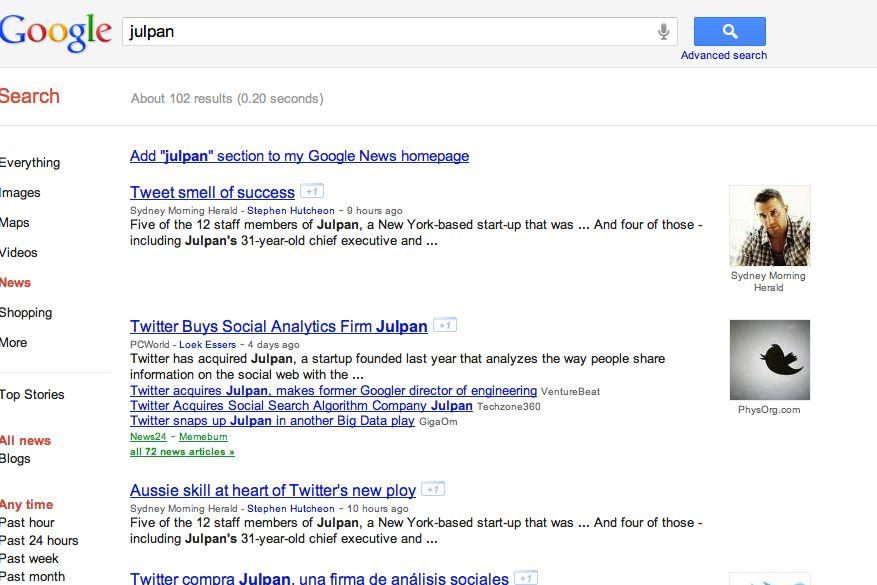Twitter buys social algorithm firm Julpan, and with it a little Aussie ingenuity
Google Chrome is now the world’s most-used Web browser, beating out Internet Explorer for the first time late last week.
It's a phrase that's thrown around fairly liberally Down Under: Aussie ingenuity.
It basically means Aussies are good at things other than beer drinking, barbies and beachcombing.
A surprising number of wonderful inventions originated Down Under, as it turns out. Australian Geographic lists a few:
- the electronic pacemaker
- the black box flight recorder
- inflatable aircraft escape slides
- the electric drill
- spray-on-skin
- the bionic ear
- permanent-crease clothing
- pre-paid postage
- and last but not least, Vegemite (although tragically for many Aussies, it's since been acquired by U.S. company Kraft)
And if that doesn't impress you, consider that the platform for Google Maps was invented by Danish-Australian brothers Lars and Jens Rasmussen and developed by an Australian team in Sydney.
Last chance:
In 1992, John O' Sullivan and the CSIRO developed wifi technology. John and his colleagues were originally looking for black holes.
In case you're thinking of disputing this little factoid, the Australian Government backs it up — like, officially — on the Department of Broadband, Communications and the Digital Economy website.
Enter Julpan, a New York-based start-up purchased by Twitter late last week in a multimillion-dollar deal that "eclipses" the $40 million paid by the social networking giant for TweetDeck in May, according to the SMH.
Five of the 12 staff members of Julpan, which according to TechCrunch "focuses on analyzing social information that is shared on social services like Twitter, graduated from Australian universities.
Julpan's 31-year-old chief executive and founder, Ori Allon — and three of others — studied at the University of New South Wales' school of computer science and engineering, a point not lost on Dr Eric Martin, Allon's PhD supervisor.
The SMH quotes Martin as saying:
"It's a fantastic outcome with this venture and the fact that five of them were educated in Australia and four of them came from my university sends a strong message about the quality of our education system."
Julpan's attractiveness to Twitter is its algorithm, the SMH reports, which…
analyzes all manner of activity on the social web — from Tweets to status updates — to provide a real-time snapshot of what the world is thinking and doing this very moment. The formula also takes a user's own social web activity into account to better interpret the context of a search to retrieve more relevant information.
Ori Allon, posting on the Julpan website, is somewhat more demure:
We founded Julpan more than a year ago. In that time we've created innovative, early-alpha-stage search technology that analyzes social activity across the Web to deliver fresh and relevant content to users.
Leaving aside that Allon was, in fact, born and raised in Israel (he came to Australia in the mid-'90s and became a naturalized citizen), the story gets even more interesting, from an Australian perspective.
The Rasmussen brothers also invented a project intended to re-invent internet messaging, which they initially called Walkabout, but which launched in 2009 under the name Google Wave. Google Wave has since been withdrawn by Google because "it did not lure the sea of users the company had envisioned."
Allon — who qualified as an example of Aussie ingenuity by completing his bachelor and masters degrees at Melbourne's Monash University, before moving to UNSW — worked on Google Wave.
The search giant hired Allon in April 2006, after buying his University of NSW PhD thesis — a paper on a new search algorithm called Orion.
According to the SMH:
Orion was rolled into the main Google search algorithm in March, 2009 and lauded as an improvement that would deliver a better result, based on an improved interpretation of what a user is searching for. Dr Allon left Google later that year, starting Julpan in January 2010.
Back to the news of Twitter's big purchase:
Here's Allon's take, on the Julpan website:
"With more than 230 million Tweets per day on every subject imaginable, Twitter gives us a chance to make an even greater contribution toward instantly bringing people closer to what is most meaningful to them. We look forward to joining forces with Twitter's engineering team to explore how we can best integrate and optimize Julpan's innovations."
His biggest fan, Martin, thinks the pleasure should be all Twitter's:
"If you know Ori, I’m sure he will keep surprising us. He has a lot of great ideas and I’m sure he will continue to have a big impact on how we use technology for decades to come.”
We want to hear your feedback so we can keep improving our website, theworld.org. Please fill out this quick survey and let us know your thoughts (your answers will be anonymous). Thanks for your time!
